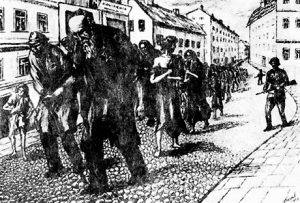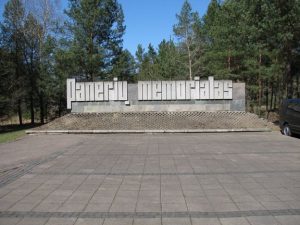War period
Vilna under Lithuanian and Soviet rule: 19th September 1939 – 22 June 1941
The Red Army captured Vilna on the 19th of September 1939. On the 10th of October it was made known that Vilna was to be transferred to independent Lithuania. Free movement to Vilna was possible until the end of October and thousands of Jews took advantage of the opportunity and moved from Polish territory, which was under Soviet rule, to Vilna. Among them were the leaders of the Zionist parties, youth movement members and yeshivas together with their Rabbis. The border between Lithuania and the Soviet Union was closed in mid-November 1939. From that point on the border could only be crossed illegally.
In the eight months of Lithuanian rule, 12,000 – 15,000 Jews fled to Vilna, predominantly from Polish areas captured by the Soviets, among them over 2,600 members of Zionist youth movements. Vilna was a hub of diverse Jewish activity and became an important Jewish centre; maintaining links with Jewish centres both in Lithuania and around the world including the communities in Soviet territory and communities in Poland under Nazi rule. Representatives of the Jewish political parties, the Zionist leadership and yeshiva students of were all concentrated in Vilna. The collected leadership of the youth movements in Vilna – Hanoar Hatzioni, Hashomer Hatsair and Dror Hechalutz - organised an umbrella organisation, "The Coordination of Pioneering Youth Movements". The Coordination helped its members to obtain certification, accommodation and employment and also organised the distribution of immigration permits to Eretz Israel. Approximately a thousand Jews left Vilna during the period of Lithuanian rule.
The Lithuanian government allowed and even assisted cultural Jewish activities. Three daily Jewish newspapers were published in Vilna and a Jewish Historical Committee was established to collect witness testimonies and evidence of antisemitic activity in the areas of Poland under Nazi occupation.
In mid-June 1940 Vilna was transferred to the Soviet Union and the widespread Jewish activity was brought to a stop. On the first of July 1940 all movements and political parties, other than the Communist party, were declared illegal. Jewish and Zionist institutions were closed and Bundist Jews, Zionists and anyone defined as "Bourgeois" were exiled to the depths of the Soviet Union, where many were imprisoned in camps. The youth movements continued their activities underground. For the most part, the individual movements acted independently and the "Coordination" ceased to exist. Jewish refugees from Poland began leaving Vilna, with permission of the Soviet authorities and with the assistance of the Japanese Consul Sempo Sugihara, the Dutch Consul Jan Zwartendijk and the British Consul Gant, who issued visas to Eretz Israel. During the Soviet period, approximately 4,000 Jews succeeded in leaving Vilna. Some reached Eretz Israel via Moscow and Shanghai, others travelled through Moscow, Odessa and Turkey. Among them were around 130 graduates of the Zionist youth movements, some with legal papers and others with papers that had been forged for them at the movements' headquarters in Vilna.
From: Yad Vashem
And there is Another Kind of Holocaust/By Shoshana Reshef
…and there is another kind of Holocaust, not known by many. The reason is that this Holocaust has not been researched yet and to this day many have not heard of it…
What is well known is that millions of Jews fled for their lives from the Nazis to the Soviet Union in the hope of being saved. Some did succeed. However, there were those who were exiled by the Soviets themselves, considering them capitalists, that is, 'enemies of humanity,' and especially enemies of the Russian people.
The place: Vilna - Poland in those days. The time: June 1941, Shabbat, 5 a.m. - thunderous knocks on the door.
Within half an hour, my family, Popko and Kahana were arrested, and this because they were wealthy, i.e. 'enemies of the regime' – 'criminals'.
Within half an hour they were uprooted from their home carrying with them only a few belongings, thrown into trucks, and on their way to the cattle cars at the train station. Destination: Siberia, the infamous Russian steppes. My father and my uncle, both young men, were separated from us at the train station. They were sent to forced labor in one of the gulags - Soviet Union concentration camps - somewhere in the distant Ural Mountains. They were forced to cut down trees in dense forests, under impossible conditions, in minus 60 degrees temperatures, humiliated, starved, and exhausted. They survived only by a miracle. They returned years later, sick and crippled… and they were lucky. So many others did not return. Hundreds of thousands died or disappeared without leaving a trace. Their crime - that they were rich, or Zionists, or Bundists.
Years of wandering from place to place across Greater Russia, unable to set up a permanent community, lacking nutrition, clothing, and organized studies, without a book or a game, and especially lacking confidence in what tomorrow might bring - thus was our childhood lost. This cannot be restored and for it there is no possible compensation.
With the end of the war, and even then in twisted and dangerous ways, we arrived in Israel - new immigrants trying to take root in a new homeland, but at least ours.
Addendum
Excerpt from my mother's testimony as written in a letter to her brother living in Israel once the war ended:
"... We stood in crowded carriages, thirsty for fresh air, tired and despairing. Our carriage contained only women, the old, and children. The men were separated from us and held whatever little money we had. We felt lost and hopeless."
Decades later I found a letter in Yiddish, written by my grandfather to his son who had lived in Israel since the 1930s:
"I did not write to you for a long time because I could not let you know, and did not want to tell you of the heartache, the terrible and dreadful disaster that befell us. We are broken and worried.
We lost our house and our respect, and especially our children Boris (my father) and Nathan (my uncle - my mother's brother).



